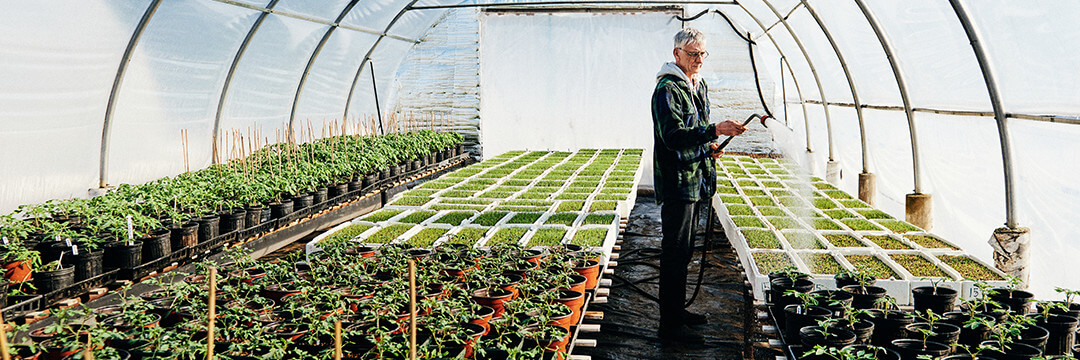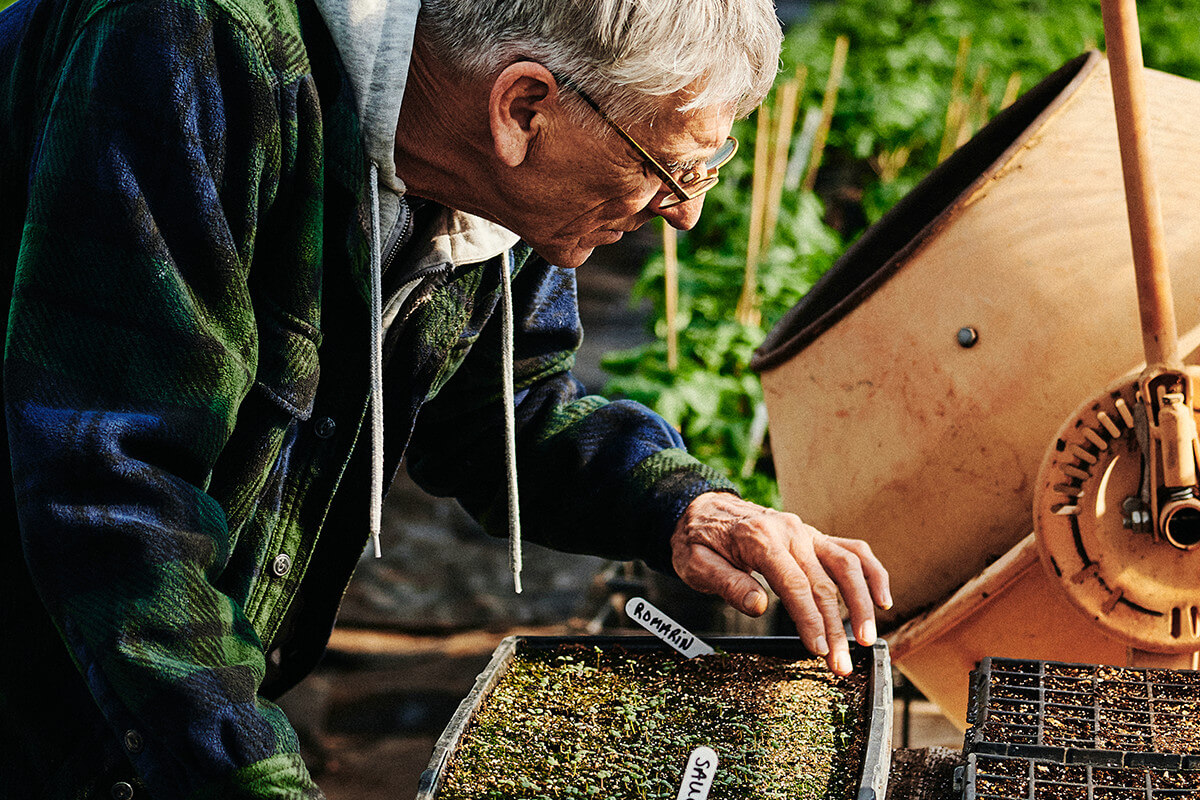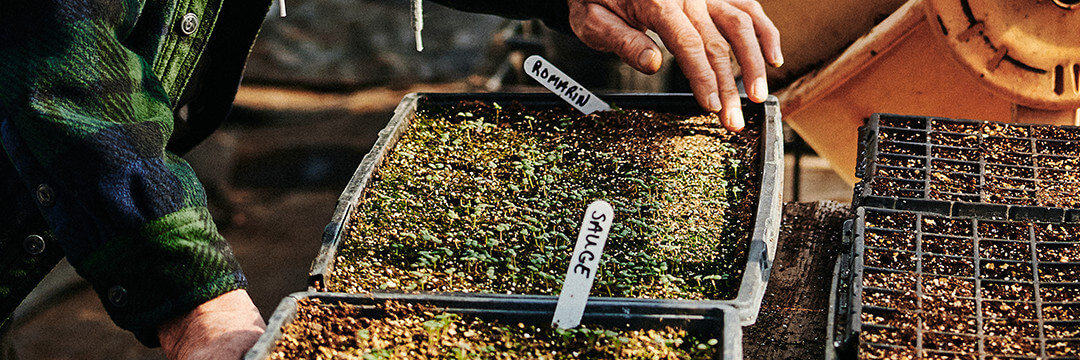BY Émélie Bernier
Magazine Growers
Robin Fortin’s improbable farming adventure began as an experiment, “just to see,” on one-and-a-quarter acres of land in 1998. Twenty-three years later, the almost-twenty flourishing acres of Ferme De La Berceuse—located in Wickham, Central Quebec, and certified organic since forever—are still going strong.

Cucumbers, cantaloupes, fennel, rutabagas, and other brassicas formerly sold exclusively at the farm’s small kiosk, are now being distributing every week in some 300 family hampers and on the shelves of local public markets. The meals provided to the young patients of CHU Sainte-Justine, in Montreal, also feature the farm’s produce. For the past two years, their products can even be found in a few affiliated grocery stores due to a partnership made with Canadian grocery giant Sobeys.
“Becoming a farmer had never been part of my game plan!” begins Robin Fortin, laughing. “In 1998, just the fact of starting an organic farm turned me into some kind of alien. At the time, the agriculture schools were empty. Now, they’re full!”
The militant farmer forecasts that Quebec is ripe for an organic revolution. “With the pandemic, the tide is starting to turn. Équiterre and the Coopérative d’agriculture de proximité écologique (CAPÉ) are working hard to create change. People like Jean-Martin Fortier have stepped up to highlight the ways in which an organic farm can be run in a profitable manner. The pieces are starting to come together.”
Young organic farmers generally follow the same path he did: farm-based kiosk, local markets, CAPÉ-supported family hampers. But, according to Fortin, it’s time to think bigger. “If you can sell everything through retail, great! I always tell the young people I speak to that sure, ‘small is beautiful,’ but once you reach a certain amount of success, you want to continue to progress, to add a heated greenhouse, big polytunnels… inevitably, you need to be able to sell your produce. At 59, I’ve never stopped growing, and I’m going to keep growing as long as it’s still fun!”
Fortin is developing a variety of sales channels in this same spirit. “When you’re a farmer, you’re condemned to sell. We’re not like milk producers who have demand management and a truck that comes to your door to pick up the product! You produce, so you sell. Every channel has its particularities and constraints—it’s fun. Personally, I’ve never wanted to restrict myself to a single market.”
Stronger together
A few years ago, Fortin found himself seated at the same table as a few Sobeys representatives.
“Initially, when a fruit and vegetable representative from Rachelle Béry called me to buy produce for around a dozen stores, I immediately realized that I couldn’t supply that by myself. So I turned to some producers I knew and we worked together to put together an offer.” Ferme De La Berceuse belongs to a collective of four organic farming organizations who together worked out a business partnership that would benefit all the members.
After two years in operation, their results are convincing, and their methodology, like our consumption habits, are becoming more refined. “The first year was a real challenge. But already in the second year, you get to know your volumes, you have a history, an initial assessment. On both sides, you get to know what works and what doesn’t. You adapt and, together, you can take things further,” explains Fortin.
In 2021, the collaboration with Rachelle Béry celebrated its third anniversary. New doors are already opening—specifically at IGA. “Rachelle Béry and IGA are both Sobeys banners. The fact that we collaborated well with them enabled us to get in the door at IGA. We’ll need to evaluate the possibilities for each farm, based on their production capacity,” resumes Fortin.
Planning is fundamental and is facilitated by working with those entities known as semi-wholesalers. “I know my total production capacity and I know that my farm will produce 300 hampers of produce as a small farmer. At Marché Drummond, where I’ve sold produce for the past 22 years, I have a specific order amount. The same goes for Marché Godefroy. I know that CHU Sainte-Justine will order approximately a certain quantity of each vegetable. I add the semi-wholesalers to the equation, and I plan my season accordingly in order to satisfy demand while experiencing as few losses as possible. It’s important not to stress out for no reason, but things need to be very carefully planned out.”
Organic for everyone?
While everyone in Quebec will not be supplied with local organic produce in grocery stores right away, according to Fortin, the process is underway. “It’s being worked on for the short, medium and long term. On the one hand, there’s education and promotion amongst customers. On the other, local producers need to realize the importance of diversifying their marketing. For the moment, there are no technical and economic studies that would enable them to understand what that would mean in terms of hampers, restaurants, institutions, the semi-wholesalers . . . nothing that will lay it all out, specify the costs, the advantages and inconveniences for each channel so that people can make informed decisions. That would enable them to better understand how to change their marketing and determine which strategies to deploy. For the semi-wholesalers, it’s extremely important and interesting what’s happening, but it’s a big cultural shift. It’s a bit like the shift taking place within institutions, like schools and hospitals, which are increasingly interested in healthy food. It’s like a whole other gateway is about to open!” Fortin says enthusiastically.

The obvious question is whether he believes it’s possible to have enough local organic food for everyone. “If everyone just stays in their own corner, it won’t be enough. But if all the producers, or at least a good portion of them, decide to start selling other than just through retail, we’ll be able to capture a significant share of the market and change consumption habits in a lasting way.”
In his opinion, not everyone is crazy about the idea of selling their produce on the shelves of big supermarkets. “There’s a lot of prejudice, even amongst producers. The question is why can’t the public have access to organic produce whenever they need it, across Quebec, in all the suburbs, small towns, etc.? Our goal, as local Quebec organic producers, must be to make our sustainably produced vegetables accessible to the greatest number of people, and it’s only through an entire ecosystem that we can get there: farm kiosks, family hampers, and grocery store shelves!”
And there’s no room for sending the most beautiful tomatoes to one grocer and the ugly ones to another, or putting the rumpled lettuces in hampers and sending the pretty ones to IGA, or vice versa. “No matter who our customer is, we need to ensure we maintain the same quality. We have high standards that are non-negotiable, because this is the future of our business!”
Viva la (organic) revoluciòn!
There’s no denying the attraction customers have to organic produce, according to Fortin. He’s convinced that they’ll choose whoever offers the most beautiful zucchini or crunchiest kale—organic, of course—in their area. “Take me, for example. I have a weakness for cooked ham, but not just any kind: I’m crazy for this one kind you can only find at this place in Drummondville. So I make the trip! It’s the same with my tomatoes. Discovering that more and more people are changing their habits because they’re crazy about organic tomatoes, that’s amazing and really encouraging.”
This openness is definitely motivating for the owner of Ferme De La Berceuse. “The success I’ve had commercially has encouraged me to produce not just more, but better! There’s a dynamic between the two, they’re both rewarding!”
Gentle giants
Skittish farmers who might be tempted to turn up their noses at the major grocery players out of fear, perhaps, of selling their souls to the big bad capitalists, should learn a lesson from Fortin.
“To ensure the continuity of your farm, you must sell. In agricultural production, there will always be ups and downs. The bigg est challenge is to attain development, stability, and yield. Everyone knows that diversifying your production decreases risk, but diversifying your marketing does the same thing! One thing is clear: If you’re a good producer, you’ll always have buyers!”
For Fortin, a partnership with semi-wholesalers can be very profitable. “This is an important niche. You make a bit less money sales-wise, but in the end not really, because it costs you less in conditioning, packaging, and administration! You don’t have all the duties related to retail sales, no rent, no customer service management . . . You harvest, you prepare the order, you deliver it, you invoice for it, done! The time you save you can put back into improving your production.”
Shouldn’t producers fear the effect of dumping on prices? Fortin doesn’t think so, and the partnership he’s made with his three other producers is exactly the way to hedge against the occurrence. The mutual respect between all parties does the rest.

Education, one radish at a time
Twenty-three years ago, Fortin would have laughed if someone had told him he would be selling his produce alongside Mexican avocados and Costa Rican bananas. “Honestly, seeing my carrots at Sobeys, it wasn’t very intuitive! I would never have considered approaching them. I had always thought that the demand for organic would increase slowly, but now I really get the sense of being at the centre of a big movement. The demand is there, and the willingness too. We all win by working together!” affirms Fortin. For him, grocery stores are first and foremost just one more channel for reaching the ultimate goal.
“To make this transition, so that organic becomes the standard, we have to get every niche accustomed to our way of doing things. That and nothing less is what it will take to accomplish a revolution!” states the militant farmer, who’s persuaded that a true organic revolution is just waiting to unfold.

